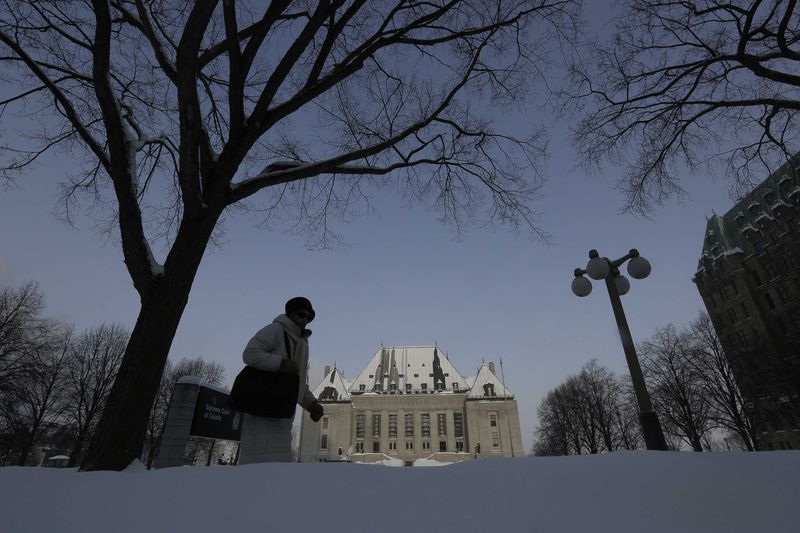By Randall Palmer
OTTAWA (Reuters) - The Supreme Court of Canada overturned a ban on physician-assisted suicide on Friday, unanimously reversing a decision it made in 1993 and putting Canada in the company of a handful of Western countries to make it legal.
The top court said mentally competent, consenting adults who have intolerable physical or psychological suffering from a severe and incurable medical condition have the right to a doctor's help to die. The illness does not have to be terminal. The decision takes effect in 12 months.
"We do not agree that the existential formulation of the right to life requires an absolute prohibition on assistance in dying, or that individuals cannot 'waive' their right to life," the court said.
Friday's decision rejected the argument by Prime Minister Stephen Harper's government that the ban should remain intact. The case related to two women with debilitating illnesses who have since died.
Gloria Taylor, an activist who had a neuro-degenerative disease, joined the right to die lawsuit in 2011 and died of her illness in 2012.
The family of a second woman, Kay Carter, who travelled to Switzerland to end her life, was also a plaintiff. Assisted suicide is legal in Switzerland, along with Belgium, Luxembourg and the Netherlands and a handful of U.S. states.
LAST RULING IN 1993
Canada's Supreme Court ruled narrowly, 5-4, against assisted suicide in 1993. It agreed last year to take another look.
The sole judge left on the court from the last time is Beverley McLachlin, now chief justice, and she supported assisted suicide then.
"This is one incredible day," said Grace Pastine, litigation director of B.C. Civil Liberties Association, which initiated the challenge.
"Physician-assisted dying is now recognised for what it is: a medical service that brings an end, for some individuals, to unbearable suffering."
Parliament can overturn the court's ruling, using a rarely used constitutional clause, but that is an unlikely outcome.
The Canadian government said it would study the decision and gave no indication whether it would oppose it.
The 9-0 ruling was the latest defeat for the government before the Supreme Court, where the prime minister has sought to appoint more conservative judges. Harper has appointed seven of the nine judges since taking office in 2006.
Last year, the court blocked Harper's plans to introduce elections to the Senate and term limits for senators. In 2013, it struck down Canada's restrictions on adult prostitution as unconstitutional, over the government's objections. Both decisions were unanimous.
OCTOBER ELECTION ISSUE?
Canadian parliamentarians, heading into a federal election in October, will have a year to implement a regulatory framework. The government can also do nothing and simply allow the court ruling to come into effect in 12 months' time.
Parliament has previously rejected several attempts to legalize physician-assisted suicide through bills brought by its members.
Religious groups and organizations representing disabled people had opposed any relaxation of the ban, arguing that this would make them vulnerable to being killed.
"This ruling has made it clear that people with disabilities are being targeted and invited to end their lives," said Taylor Hyatt, who has cerebral palsy and spoke from a wheelchair in the Supreme Court foyer. "There's an assumption that your life is unbearable and there's nothing good in it."
Others, such as quadriplegic Conservative Member of Parliament Steven Fletcher, argued that they should have the choice.
"There does need to be some criminal code provision, I think, to prevent abuse. I don't want people, because they have a bad hair day, to get their car mechanic to take them down," Fletcher said in the lobby of the court on Friday.
"We want to make sure that we move forward quickly, but thoughtfully, and the Supreme Court has really given us a clear path."
Fletcher said to avoid the matter becoming an election issue, it should be dealt with in the current session of Parliament which ends in June before politicians take to the hustings.
It is too early to know if Canada will become a suicide tourism destination, like Switzerland, said Right to Die Society of Canada president Ruth von Fuchs. She said it was unclear whether Canadian law would allow the practise for non-residents.
Allowance for those suffering unbearable psychological pain is not unique, von Fuchs said. It was included in a bill passed last summer by the Canadian province of Quebec, for example, and Switzerland allows assisted suicide for people suffering debilitating mental illness, though it is uncommon.

The case is Carter v. Canada (Attorney General), 2015 SCC 5.